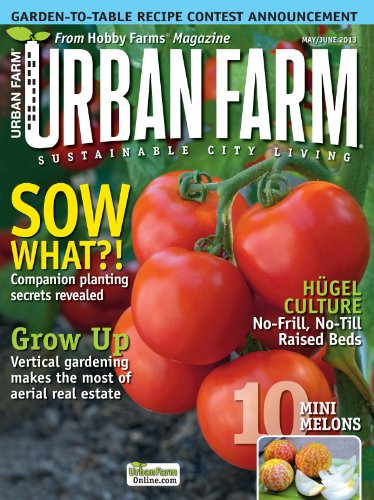A guide for those in cities or suburbs looking to become more self-sufficient by growing some of their own food and treadig lightly on the environment in the space they have. Articles include how-to projects, gardening basics, composting, beekeeping, roof-top gardening, preserving and freezing, and time and money-saving ideas.
Who Reads Urban Farm?
Urban Farm reaches out to those in the city and suburbs who endeavor to live more self-sufficiently, are inspired by the local-food movement and want to raise chickens and other small livestock. They grow food for themselves, support local agriculture and live more sustainably by reducing their impact on the environment.
What You Can Expect in Each Issue: Regular Sections
- Backyard Coop: Everything a backyard chicken keeper needs to know to have a healthy, well-cared-for flock. Each issue focuses on a different topic of urban chicken keeping.
- Green Thumb: Seasonal backyard and container-gardening advice, including fruit and vegetable variety selection and cultivation, fertilizer recipes, composting techniques, and useful tools.
- Urban Feast: Bringing the eat-local mantra home. This column covers seasonal recipes, kitchen tools, serving ideas and more.
- Curbside Tools: A round-up of tools and equipment related to one feature in every issue. The column topic might be composting tools, wine- and beer-making equipment, chicken-keeping equipment or any other area of sustainable living covered in the magazine.
- One Thing: A piece of advice from a successful and well-known urban farmer. This page offers one thing you can do to live more sustainably right now.
- Road Trip: Urban Farm visits one city or town in every issue and focuses on its sustainability initiatives, famous urban farmers and green happenings.
What You Can Expect in Each Issue: Feature Articles
Urban Farm’s feature articles are written to inspire people as they develop their city or suburban farm or garden. They cover what it means to live a sustainable lifestyle, including conserving, growing our own food, eating locally and in season, recycling, composting, and making intentional buying decisions. Articles include how-to projects for self-sufficiency, sustainable community initiatives, profiles of successful urban farmers, beekeeping, backyard goat keeping, raising rabbits, small-space gardening techniques, community-building advice, crop profiles, protecting your urban farm from wildlife, step-by-step cooking projects, alternative energy and more.
Contributors:
Urban Farm contributors are urban farmers themselves. Whether they are professional gardeners, keep a community-supported-agriculture operation on a small suburban lot or simply live a green lifestyle, our writers understand the challenges and the triumphs of living a sustainable life. Some of our writers are published and respected authors; others work hard every day to build a self-sufficient life for themselves and their families. Regular contributors include Erik Knutzen, Deborah Madison, Amy Colter, Barbara Kilarski, R.J. Ruppenthal, Jessica Walliser, Frank Hyman, Kelly Wood, Cherie Langlois and Debbie Moors.
Magazine Layout:
The magazine features easy-to-follow sections based on article topic. Urban Farm’s design is engaging and easy to read. The photos, graphics and design are fun and edgy, reflecting an urban audience. There is a fluid mix of text and images that illustrate the articles and concepts.
Comparisons to Other Magazines:
From the editors of Hobby Farms and Hobby Farm Home, Urban Farm’s mission is to promote the benefits of self sufficiency and to provide the tools with which to do it on any size property. Urban farms are popping up all over America. However, things are different on an urban farm, versus a rural hobby farm. With less space to work with, projects must be scaled down, efficiency becomes crucial, and one must be resourceful to use every inch of space and recycle every unused object into something useful. Urban Farm is informational and inspirational in context with no political undertones. Throughout each issue, weblinks direct readers to additional, free resources related to the magazine’s content on the UrbanFarmOnline.com website.
Advertisers:
Advertising is relevant to the magazine, offering products and services designed to assist in living more self-sufficiently, such as feed and small-livestock products, kitchen appliances and tools, cooking and baking products, hardware, tools, gardening and composting supplies, beekeeping supplies and equipment, and alternative-energy products.
Additional Information:
The tone of Urban Farm is upbeat and informational. The magazine provides information, highlights the benefits and lets the reader draw their own conclusions. Urban Farm is expertly written and beautifully illustrated to appeal to the intelligent consumer who understands the need for more sustainable practices.




Comments are disabled for this post.